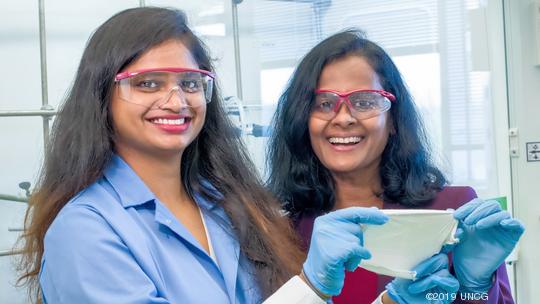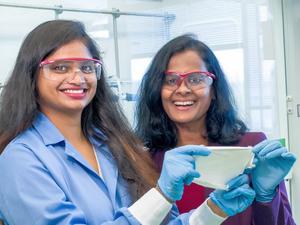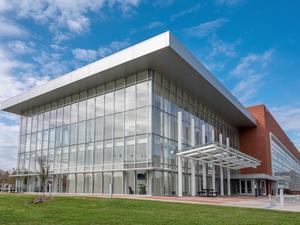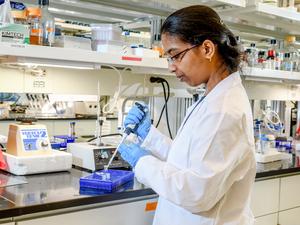
Editor's note: Over the next two days we'll be introducing Triad Inno's Startups to Watch, a new program that highlights early-stage companies primed for a big year. The feature is a key component of our new Triad Inno platform emphasizing entrepreneurship as a dynamo to move this region forward.
Minerva Lithium
Year founded: 2020
No. of employees: Three full-time; two student researchers
Top executives: Sheeba Dawood, CEO/co-founder; Hemali Rathnayake, co-founder
Address: 2901 E. Gate City Blvd., Greensboro 27401
Phone: 336-701-2474
Why watch: Think of all the things you need batteries for – your television remote, your laptop, your smoke detector, just to name a few. And what do batteries need? Lithium, an essential mineral. Although largely found in deposits, lithium can be commonly found in trace amounts in wastewater as a byproduct of petroleum extraction. Removing the trace amounts is a lengthy and arduous process, but Minerva Lithium promises to make it easier with a lithium-trapping filter.
A spinoff company of UNC-Greensboro, Minerva Lithium was founded by Sheeba Dawood, a UNCG alumna, and Hemali Rathnayake, an associate professor at UNCG’s Joint School of Nanoscience and Nanoengineering (JSNN). Their Nano-Mosaic filter can selectively trap molecules of lithium measuring between one to three nanometers, or roughly a billionth of a meter, and can be applied in a range of water salinities, lithium concentrations and climates.
The proprietary filter can trap lithium from water with a success rate of 90% in less than 24 hours by processing up to 55 gallons per minute. This is a vast improvement over traditional lithium recovery methods, which typically take about 18 months and can only recover about 30 to 65% of lithium in water.
The filter is commercially viable when the lithium content in wastewater is 400 milligrams per liter or greater; generally, the amount of lithium ranges from 400 to 1500 milligrams per liter.
Minerva Lithium’s nano-filter uses a polymer that is naturally abundant, renewable and relatively inexpensive. More exciting – literally – is that the polymer is a natural conductor, meaning that once filled with lithium molecules, the filters essentially become batteries and are ready to store electricity.
Lithium consumption for batteries is expected to significantly increase in coming years, as rechargeable batteries are needed for portable electronic devices and electric vehicles. Currently, lithium can cost upwards of $8,000 per ton, and about 65% of the global market for lithium is used in batteries, according to the United States Geological Survey.
“There are many consultancies that are interested in our technology because of the boom that lithium currently has,” Dawood said.
Earlier this fall, Minerva was awarded a $256,000 Small Business Innovation Research grant from the National Science Foundation as Minerva shifts to pilot-scale research and identifying potential investors and clients.
Previously, Minerva Lithium had been a part of the 2020 Greensboro I-Corps program and had been granted a $50,000 National Science Foundation I-Corps Award, which supported Dawood’s field research in the petroleum industry.
Minerva won the two-minute pitch competition at the 2021 Capital Connects, an event held by Launch Greensboro, and was awarded $1,000. It has also seen interest from groups such as the Air Force and Eagle Point Funding.
In October, Dawood presented at TechConnect, a national conference that connects emerging technology innovators with industry and government clients and potential investors. There, Minerva was pitched under the Energy Innovation Spotlights IV: Vehicle Electrification category andwas awarded the TechConnect Innovation Award for 2021.
Currently, Minerva Lithium is utilizing the grant for large-scale production of the material needed to make the filter. Dawood and Rathanayake expect to have the filter prototype fully developed by March and to complete testing by the end of June.
“Then we do have something in our hand to take to the customers,” Rathnayake said.
Once its prototype is validated, the company can move into field testing and commercialization. Dawood has already identified sites and secured an undisclosed “major” oil company for field testing.
At that point, Minerva Lithium can also apply for Phase II SBIR funding, demonstrating at least three to four letters of interest from potential clients. Currently, Minerva has about eight clients interested in testing its filter and will complete pilot scale testing with the Colorado School of Mines.
Q&A with Sheeba Dawood and Hemali Rathnayake:
Lithium is a critical mineral today, but do you foresee expanding Minerva Lithium’s technology to filter for other pathogens or be used in different ways? Since this is a platform technology, we are looking forward to expanding these materials into filtering for other critical minerals. Minerva Lithium also has other horizons, like batteries, so that is where we are also receiving a lot of interest and we will also focus on that.
What is the plan for commercialization and revenue generation? Our business model plan for revenue generation is a sales revenue model in which we generate revenue by either sale of our product – adsorbent filters – or providing our services to customers – customizing our adsorbent filters to fit into a customer’s existing infrastructure. In the commercialization phase, we will decide what way we would reach out to the market, whether it’s licensing or selling. That phase will give us clarity and help us understand.
Do you plan to keep Minerva Lithium in the Triad? We are looking forward to growing Minerva Lithium as a small business entity in the Triad and staying in the Triad, although we have had multiple requests to relocate to Research Triangle Park. Minerva Lithium hopes to continue partnering with UNCG, especially given the continuous support received from LaunchUNCG, Director of Innovation Partnership Services Sam Seyedin, Vice Chancellor for Research and Engagement Terri Shelton and JSNN. The relationship with and strong support from UNCG and JSNN will be the key to Minerva Lithium's success and to stay in the Triad.
Coming this afternoon: Live Furnish
Yesterday's Startup to Watch: Nvolve








